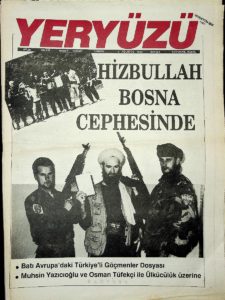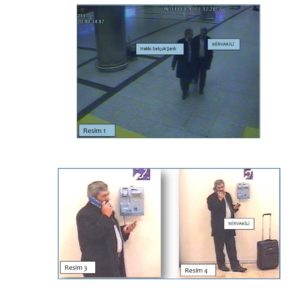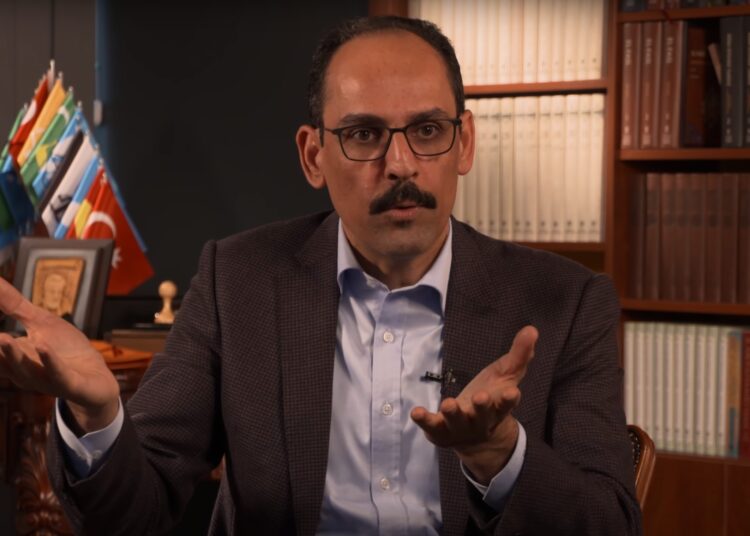Abdullah Bozkurt/Stockholm
In a resumé posted on the official web page of Turkish intelligence agency MIT, İbrahim Kalın, the newly appointed spymaster, did not mention his work for an Iranian-funded, radical Islamist publication that was shut down over its links to terrorism.
Kalın’s connection to the Yeryüzü magazine, which promoted an Iranian-style religious revolution in Turkey, and his past work that praised Iran’s Khomeini was deliberately omitted from the long resumé published by the agency last week about the new chief of the notorious intelligence service.
Yeryüzü is no ordinary magazine. It was named a focal point for the Islamic Revolutionary Guard Corps (IRGC) Quds Force in the Turkish capital in an indictment drafted by the chief prosecutor’s office at the State Security Courthouse in 2000. The cell was run by Ferhan Özmen, who was trained in arms and explosives in Iran and was convicted of a series of murders including that of journalist Uğur Mumcu in the 1990s.
In every issue the magazine ran viciously anti-Semitic and anti-Western content, endorsed violent and armed jihad and often featured prominent Iranian mullah figures as revered personalities.
Kalın appeared in Yeryüzü’s December 15, 1990 edition, which featured an article under the title “Muslims can fight only for Allah.” The article was written to promote a view against Turkey’s involvement in the First Gulf War to help a US-led, multi-nation coalition to respond to the Iraqi invasion of Kuwait on August 2, 1990. Then-Turkish President Turgut Özal was advocating Turkey’s participation in the coalition, while the military was reluctant to do so.
İbrahim Kalın’s resumé as posted on the official web page of Turkish intelligence agency MIT:
Kalın, a young student at Istanbul University’s faculty of literature at the time, said in the article that large protests must be organized nationwide and that people must react to actions such as mobilization of the military or Turkey sending troops to join the US coalition. In the same article others were quoted as saying that if they were sent to fight, they would first kill the US or British officers in their units rather than fire on Iraqi troops. Muslims need to wage a war against the Americans and their collaborators and not fight for the interests of the US, some said in the same article.
During the First Gulf War, Turkey did not send troops to fight against Iraq’s invading forces but allowed American aircraft to operate out of Incirlik airbase in Turkey’s southern Adana province. Turkey also beefed up its troop presence near the Iraqi border, preventing the regime of Saddam Hussein from moving some of its forces to active conflicts in the south against the coalition forces.
In an article titled “Geç Kalmış Bir Tanıtım” (A late introduction) published in the Kitap Dergisi (Book Journal) in December 1989, he praised Iran’s Islamic revolution and its late leader, Ayatollah Ruhollah Khomeini, drawing on rhetoric from the mullah regime. Kalın characterized Khomeini as “the guide [rehber] of the uprising [kıyam],” “leader of the Islamic revolution,” “imam of revolutionary Muslims” and “an example of devout Muslims.”

Second page of the article by İbrahim Kalın:
Quds Force operations that were centered around the Yeryüzü magazine were well documented by Turkish investigators in a landmark criminal case in early 2000. According to court testimony by Turkish police chief Erkan Ünal, who investigated Quds Force cells between 2011 and 2014, Iranian agents used the magazine to run their clandestine operations. He told the judges at the Istanbul 14th High Criminal Court on March 19, 2018 that many reactivated Quds Force assets, some in fact later designated under sanctions by the US Treasury, were members of this Yeryüzü cell in Ankara.
Almost every issue of the magazine was subject to legal action by the authorities, and judgments were rendered to confiscate all copies of the magazine in circulation. The magazine was forced to shut down under a series of criminal investigations that charged many of its employees including editor-in-chief Burhan Kavuncu, a leading Quds Force operative, under counterterrorism laws.
The ensuing trials revealed how Iran planned and committed murders, bombings and kidnappings in Turkey using its Turkish operatives working in coordination with Iranian handlers. Many were identified as members of the Yeryüzü cell. Evidence confirmed that the offices of Iranian-funded magazines and newspapers such as Yeryüzü, Tevhid and Selam were used as meeting venues for Quds Force operatives and that the publications also served as a means to reach new recruits.

Most Quds Force suspects who were convicted on serious charges were released after Erdogan came to power in the November 2002 election, some through amnesty bills pushed through parliament by the government, and others through retrial schemes orchestrated by the Justice Ministry, which was dominated by Islamists.
However, a renewed counterterrorism probe into the Quds Force, known by its Turkish name, Selam Tevhid, was launched in 2011 by prosecutors in Istanbul after tips and intelligence picked up domestically by Turkish police as well as intelligence passed from the US and Israel revealed that Iran had reactivated many of its former operatives who were in fact identified in investigations during the 1990s and early 2000s.
As the probe deepened, some senior government officials including two advisors of President Erdogan as well as then-head of MIT Hakan Fidan were incriminated over links to Iranian Quds Force cells and Iranian generals. Erdogan killed the probe in February 2014 as soon as he was alerted to its existence, and the case never went to trial. Instead, investigators who mapped out the Quds Force network in Turkey were punished by the Erdogan regime, and some were imprisoned on bogus charges.
Pages from the December 15, 1990 edition of the Iranian-funded Yeryüzü magazine, which featured İbrahim Kalın:
The evidence collected in the Turkish investigation between 2011 and 2014 was corroborated by the US as well when a designation, announced by the US Treasury in May 2021, sanctioned key operatives of the Quds Force who had already been identified during the probe run by Turkey’s public prosecutors and police until 2014.
According to the US Department of the Treasury’s Office of Foreign Assets Control (OFAC), Turkish nationals Hakkı Selçuk Şanlı, Abdulhamit Çelik and Seyyid Cemal Gündüz worked with IRGC official Behnam Shahriyari, who was in Turkey under the assumed name of Sayyed Mir Vakili, in an international oil smuggling and money laundering network that generated hundreds of millions of dollars on behalf of Iran and its proxy Hezbollah in Lebanon.
Şanlı was arrested on May 13, 2000 and was sentenced to 12 and a half years in prison for involvement in terrorist plots targeting Turkish and US interests. The trial revealed how he and his associates helped set up the Quds Force network in the 1990s on the orders of then-IRGC general Nasir Takipur.

But he was freed in 2004 when the government of then-prime minister Erdogan pushed an amnesty bill through parliament, reducing the sentences for some convicts. He was put to use again by his handlers after keeping a low profile for years and started running several operations including moving funds on behalf of the Quds Force, providing financial support for Quds Force operatives in prison and managing a recruitment and asset development program for Iranian intelligence in Ankara.
Like Şanlı, his associate Çelik also has a long rap sheet in the Turkish criminal justice system. In 1996 Çelik was convicted of killing two opponents of the Iranian regime in Turkey and sentenced to 12 years, six months in prison, though he was released in 2004 as a result of the amnesty. He admitted in testimony in May 2000 as part of the Tevhid Selam probe that he had been trained for over two months in Iran to stage attacks in Turkey and conduct intelligence operations on behalf of Iran.
Gündüz, another associate of Şanlı, was also red flagged in the Turkish probe. Married to an Iranian woman, Gündüz had had contacts with Iranian intelligence since the 1980s and established businesses in both Iran and Turkey.

Today Kalın, who was associated with the Quds Force, is now in charge of the Turkish intelligence agency, an institution that was restructured to keep Erdogan in power through false flags and clandestine operations. In the last decade MIT has become notorious for kidnapping Erdogan’s critics, detaining them unlawfully for a long period of time and subjecting victims to torture at black sites.
MIT’s aggressive operations abroad elicited pushback from foreign countries and resulted in criminal investigations and even trials. In June 2018 the Office of the Attorney General of Switzerland issued arrest warrants for the two Turkish diplomats, then-Press Attaché Hacı Mehmet Gani and Hakan Kamil Yerge, then-second secretary at the Turkish Embassy in Bern, for plotting to drug and kidnap a Swiss-Turkish businessman in 2016. Some Turkish diplomats are believed to be MIT agents working under the cover of a diplomatic position.
In 2015 Germany’s federal attorney general charged Muhammet Taha Gergerlioğlu, a close advisor of Erdogan and a MIT operative, with espionage because he and two of his associates collected information on people of Turkish origin living in Germany who were critical of the Turkish government. Gergerlioğlu was later released as part of a political bargain between Turkey and Germany.












